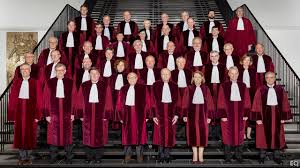Judges at the European Court of Justice are deliberating on whether the UK can call off the Brexit process without permission from member states.

The UK will leave the EU on 29 March under the terms of “Article 50”, which MPs triggered in March last year.
A group of Scottish politicians lodged a court challenge to find out if this can be unilaterally revoked.
UK government lawyers argue that the case is inadmissible and is being used as “ammunition” by opponents of Brexit.
And lawyers for the European Council and European Commission argued that states being allowed to withdraw from or pause the Article 50 process could let them abuse the system and create “endless uncertainty”.
The judges are expected come back with a ruling at a later date.
The case is being considered against the backdrop of Prime Minister Theresa May fighting to sell her draft Brexit deal to MPs, ahead of a vote in the Commons in December.
Those pushing the court case say it could give MPs an extra option when considering whether to approve the draft deal or not, because it could keep the prospect of calling off Brexit altogether on the table.
The case was first raised in the names of a cross-party group of Scottish politicians including Green MSPs Andy Wightman and Ross Greer, MEP Alyn Smith and MP Joanna Cherry of the SNP, and Labour MEPs David Martin and Catherine Stihler.
They want the court to rule on whether or not the UK can unilaterally revoke Article 50, and were given leave to take their case to Luxembourg by the Scottish Court of Session.
Mr Wightman said: “The question as to whether MPs can unilaterally revoke Article 50 is vital, as the chaos around Brexit shows no sign of being resolved. The UK parliament must be fully informed of all of its options.”
The UK government has opposed the case being heard from the outset, but failed to prevent it going before judges in Luxembourg after a series of appeals.
The UK government’s position is that the court has “long refused for very good reasons” not to answer hypothetical questions, and that because ministers do not intend to revoke Article 50, the question of whether they can or not is hypothetical.
Ms Cherry raised the case and the issue of revoking Article 50 with Mrs May in the Commons on Monday, prompting the prime minister to say that “it is not going to happen because it is not government policy”.
The government’s lawyer also argued in court that the case had been brought by opponents of Brexit, who would use the ruling as “ammunition” in their political campaign.
Lawyers for the European Commission and Council argued against the UK being allowed to unilaterally halt the Article 50 process.
Hubert Legal, the chief lawyer for the European Council, argued that if departing counties were allowed to withdraw their exit notification and later resubmit it, they could “keep the ball rolling” in talks until they got a better deal, at the EU’s expense.
This was echoed by lawyers for the European Commission, who said states could act in an “abusive” manner by stopping and restarting the countdown clock, creating “endless uncertainty” – which the two-year time limit built into Article 50 was designed to guard against.
This case may seem a little obscure – one for the lawyers and academics. But it could turn out to be far more significant.
The UK voted to leave the European Union and the UK government has committed to taking us out. In these circumstances, it does not much matter whether or not Brexit – i.e. the Article 50 process – is reversible.
But if the European Court of Justice decides that it is legally possible for the UK to unilaterally cancel its application to withdraw from the EU, that would have a political impact.
It would give a boost to those campaigning for that outcome via another Brexit referendum and it would make no Brexit seem more possible as an alternative to either no deal or the deal Theresa May has struck with the EU.
Kindly follow us on twitter:@AfricanVoice2









